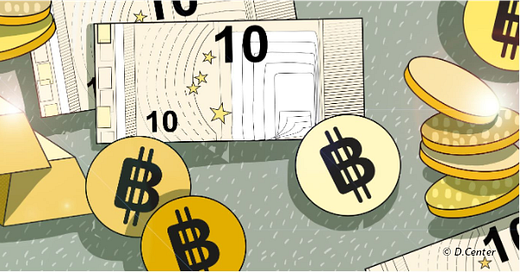This week in crypto: July 26 - Aug 1:“International” financial institutions and El Salvador, Stoner Cats and more...
“International” financial institutions and El Salvador’s Bitcoin law
The bold move of El Salvador’s President Nayib Bukele to acknowledge Bitcoin as a legal tender has created a ripple effect throughout world’s financial institutions and alike.
Suddenly everyone seems invested into El Salvador’s well-being, pouring tons of (unsolicited) warnings as to the numerous dangers of crypto. These warnings and other expressions of crypto-negative attitude have become so numerous recently that one can’t help questioning the true motives behind them.
In June the World Bank rejected EL Salvador’s request for technical assistance in Bitcoin implementation, stating “transparency and environmental issues” 🙄
The International Monetary Fund, after many a vague caution, has moved up a gear recently. This week two of its officials issued a warning that sounded more like a threat, pointing at crypto price volatility and, unsurprisingly, AML and environment issues 🙄
On Friday, one of the most notorious credit rating agencies Moody’s downgraded El Salvador’s rating from B3 to Caa1, notably because of the Bitcoin law, citing “weakened governance, raising tensions with international partners – including the United States”. Finally, we’re getting closer to the real reasons 👇
The roles of IMF and the World Bank
US is the most financially powerful country now, and most of its power stems from the Bretton-Woods agreement of 1944. Member countries were obliged to maintain fixed exchange rate by tying their currencies to gold, and since the US had the biggest gold reserves, the majority just sold their gold to the US at $35/ounce and pegged their money to the dollar (of course, the US promised that everyone could redeem their gold if they wanted). IMF was the organization created to address any potential disequilibrium within the exchange rates, and the World Bank – to combat poverty.
We know what happened next. In 1971 President Nixon unilaterally decided to close the “gold window”, effectively throwing the previous promise out of the window. And gold is now traded at $1815.
What did IMF do to remedy this injustice? Nothing at all to be honest. But they are pretty scared now, when a small Latin American country made an effort to free itself from the dollar dependency. El Salvador created a dangerous precedent that could potentially challenge the dollar’s dominance of the world’s finance, and the IMF faces a delicate task to try and stop it while maintaining the official façade: “to foster global monetary cooperation, secure financial stability, facilitate international trade, promote high employment and sustainable economic growth, and reduce poverty around the world”.
From their headquarters in Washington D.C. the IMF and the World Bank try to persuade El Salvador that it must continue to rely on the dollar, while the Fed continues to printing insane amounts of it on a daily basis (and Salvadorans don’t even get stimulus checks from the US to compensate).
Well, El Salvador tried this way, and it’s still extremely poor. It is about time to try a new approach to fight poverty by acquiring monetary independence, all while opening itself to the borderless and worldwide crypto community. The Bitcoin law goes in force on September 7th.
Rating agencies?
Moody’s, of course, cannot see this. Or it does not want to. The 2008 crisis showed that rating agencies were swimming with the flow, refusing to open their eyes to the most obvious reasons, and some would argue they made the crisis so much worse. No surprise on the Bitcoin issue: until the balance of power shifts to the crypto side (and we’re so not there yet), rating agencies will continue condemning it.
The current financial situation is a consequence of very smart post-war negotiations and bold moves that followed. The important thing to know is that the world order is not fixed in stone and the (mostly American) financial institutions don’t know what’s best for everyone else. They are centralized organisations managed by humans who have an idea what’s best for them – and it’s perfectly normal, for this is the human nature.
This makes decentralized systems like Bitcoin all the more important, for the blockchain is governed by rules and not rulers.
Art and NFT
This week’s most talked-about NFT event is undoubtedly the Stoner Cats series produced by the actress Mila Kunis. It is about cats whose owner accidentally throws a pack of medical marijuana into the fireplace – and they end up getting high by inhaling it.
To unlock the videos, one must buy an NFT of one of the cats and connect a wallet containing it to the Stoner Cats website. With a high-profile cast including Ashton Kutcher, Jane Fonda and even Ethereum creator Vitalik Buterin the series was promised to a great start – but it turned out even better. Actually, so much better that the high demand messed up the series’ smart contract’s gas estimations, which led to some users losing their gas, but not succeeding in buying an NFT. The series production company promised to make up for this bummer, and in the meantime the cats’ NFTs prices are exploding on the OpenSea marketplace.
We at D.Center confirm, the cartoon is hilarious.
Markets
Bitcoin
Bitcoin price gained another 13% last week, rising at one moment over 20% and corrected since. The price is around $40250 at the time of writing.
Ethereum
This week Ethereum celebrated its 6th anniversary - and the list of achievements for such a young age is impressive. It is a number 1 platform for the DeFi, NFTs and many more developments that are defining Web3. It has a number of shortcomings too, as the Stoner Cats incident showed.
So while the EIP-1559 upgrade (that will notably help to solve some gas problems) will go live around August 4th, all eyes are now on ETH 2.0 – a PoS blockchain destined to take over the original Ethereum in (hopefully) 2022.
In the meantime, Ethereum price rallied 20% this week, scoring a higher high and correcting to around $2630.
Ethereum in general is becoming ever more alluring as an asset, outperforming even Bitcoin: ETH trading volume in the first half of the year grew 1461% to $1.4 Tr, while that of Bitcoin – 489% to $2.1 Tr. This is mainly caused by institutional investors diversifying their BTC portfolios and some of them even staking some Ethers in ETH 2.0.
Quote of the week
“Instead of leaving our financial system at the whims of giant banks, crypto puts the system at the whims of some shadowy faceless group of super coders and miners, which doesn’t sound better to me”,
US Senator Elizabeth Warren, publicly confirming her ignorance of the subject she’s trying to legislate







